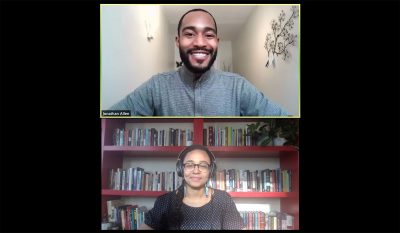The term “intersectionality,” coined in 1989 by current Columbia Law School Professor Kimberlé Crenshaw, describes how different aspects of identity — such as sex, sexuality, race and class — interact and can lead to oppression on multiple fronts.

The Boston University Alumni and Friends Association held a virtual panel Tuesday entitled “Intersections: A Conversation on Layered Identities, Equity, and Leadership,” where panelists discussed their personal experiences and how the Black community — particularly Black LGBTQ+ individuals — are at a disadvantage within larger systems.
2019 School of Law alumnus and panelist Jonathan Allen, co-founder of the Boston nonprofit The Leadership Brainery, identifies himself as a Black cisgender, gay man of faith from the South, which he said has deeply affected his understanding of intersectionality.
Allen, who came out at the age of 25, said in an interview he had struggled with his identity, especially given his early religious involvement — preaching at the age of 11 and being ordained at 20 — which carried into his adult life.
“I was afraid that my whole career, my whole future would be just vanished and destroyed,” Allen said. “I feel I held back a lot of what I did, or certainly how much I allowed myself to be in the forefront, because I was afraid that if they did find out I was gay, that would be it.”
Allen said he knows there are many members of the queer community who are also afraid to live their truth — a fear he too shared before he came out.
While some church members treated him differently after he came out, Allen said his racial identity has also played a role in how others interact with him.
“Oftentimes, I struggle with being a gay man and being a Black man because I interact and encounter challenges as a result of both of those identities in different ways with different people,” Allen said. “Before you see or know that I’m gay, you see I’m Black, and so it’s been a really interesting aspect of my journey.”
Sasha George, who identifies as a Black cisgender, queer pansexual woman, is the only Black Carribbean Latina lawyer in her office. She is an enforcement counsel at the U.S. Environmental Protection Agency in New England. Like Allen, George has also noticed the intersectional way her identity has been different from other individuals’.
“It’s been an important journey for me to understand that I’m not Black and Latina, or Black or Latina,” George said during the panel. “I present as a Black person, a Black individual, in this world, in different ways than Black non-binary people, Black trans people, Black gay people, Black lesbians do.”
George said purposeful language is important when it comes to anti-racist efforts because conversations should not exclude certain people and communities.
“I just want us to be very intentional when we talk about Blackness, that we do not exclude Black Asians, or Black Latinx people, or Black Indigenous people, because we are out there,” George said. “We exist, and we have for a long time been on these lands.”
At the event, both George and Allen agreed intersectionality is essential to social activism — in the ’60s, Black queer activists led the fight for LGBTQ+ rights in the Stonewall riots.
“You cannot be pro-queer, and you cannot be proud of queerness, if you are not anti-racist,” George said at the event. “We would not be here if not for those intersectional beings that graced us with so much power and pride.”
The focus in these fights should be equity, Allen said, and marginalized communities cannot overcome systemic oppression until systemic barriers, such as access to education and health care, are erased. Allen said if this social progress can be made, lives can be saved.
“We need to get rid of the stigma, because the stigma only kills people, it only harms our communities, and it’s being upheld because of false narratives about who qualifies, who’s worthy of dignity and respect,” Allen said. “The reality is, we all are worthy of dignity and respect.”























































































































